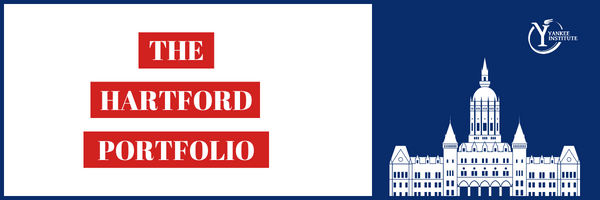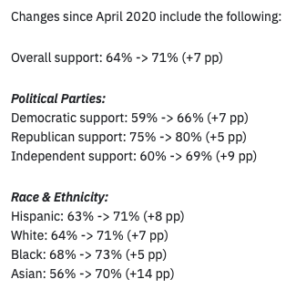Who Let the Rat Out of Its Cage?
Connecticut Inside Investigator (CII) reported on Monday (July 17) that leadership of the state House of Representatives is exploring the possibility of a special session this fall. Word has it the top brass is toying with the idea of resurrecting a bipartisan bill that enables business associations the ability to provide their own health insurance — known as association health plans (AHP).
What’s the catch? Along with AHP, the rumored bill will have a rat inserted that will force every business in the state to expand paid sick leave (although, the particulars aren’t solidified, previous proposals called for an increase from 40 to 80 hours a year). Currently, paid sick leave only applies to businesses with 50 or more employees.
AHP garnered strong support from businesses and legislators alike but failed to get called for a vote in the 2023 session.
The Connecticut Business & Industry Association calls AHP a “simple concept” that “allows trade associations to provide healthcare benefits for their member organizations. Pooled together, small employers would be able to purchase insurance in much the same way that large employers do, using the power of numbers to achieve savings that wouldn’t otherwise be possible.”
According to CII, “A last-minute effort by Access Health CT to kill the association health plan bill couched the agency’s financial concerns over potential lost revenue with claims association health plans would not be compliant with the Affordable Care Act — a claim disputed by the legislation itself, which requires AHP coverage to comply with federal regulations.”
Meanwhile, paid sick leave experienced the same fate as AHP even though it received strong backing from the progressive wing of the Democrat party, big labor and the Connecticut Communist Party.
Joelle Fishman, chair of Connecticut Communist Party USA, testified that “88% of workers in Connecticut” do not have access to paid sick days — but failed to cite her source for this data. Likewise, Connecticut AFL-CIO president Ed Hawthorne stressed in his testimony that paid sick leave “is more critical than ever.”
Neither Fishman nor Hawthorne weighed in on AHP.
Lawmakers’ decision to combine two seemingly unrelated policies into a single bill raises questions about their rationale. Speculations suggest that influential labor groups might be involved in this move. The AHP proposal has gained significant popularity and is likely to pass if brought to a vote. As a result, there are suspicions that these labor groups may be exerting pressure on their allies in the General Assembly to sneak paid sick leave into the bill — as they may perceive it to be their best chance of achieving success.
Rest assured that Yankee Institute will be keeping a sharp watch on this matter.
Sorry Teacher Unions: People Actually Want Choice in Education
A July 11 poll from RealClear Opinion Research indicates a significant surge in support for school choice across all demographics, including race and political affiliations, following the COVID-19 pandemic.
According to the survey, a remarkable 71% of registered voters now express support for school choice. This is a significant jump from the 2020 results, where only 64% supported the concept.
The data also reveals 66% of Democrats support choice (up from 59% in 2020), as well as 71% of Hispanic, 73% Black, 71% White and 70% of Asian voters when asked if they “support or oppose the concept of school choice?”
Source: RealClear Opinion Research Poll
The pollsters define school choice as giving “parents the right to use the tax dollars designated for their child’s education to send their child to the public or private school which best serves their needs.”
“School choice support is here to stay, and politicians who ignore this reality do so at their own peril,” said Tommy Schultz, CEO of the American Federation for Children, in the poll’s press release. “Parents are the new interest group in town, and legislators would be wise to keep responding to their needs. The days of the old one-size-fits-all model are numbered, welcome news for the countless students who need something different to learn and thrive.”
The states’ largest teacher unions, the Connecticut Education Association (CEA) and American Federation of Teachers (AFT) are completely against any policy that dares to give students and parents a choice.
CEA has gone so far as to threaten legislators that if they voted favorably on a bill that would change the approval process for approving charter schools, they would receive poor scores on their annual “legislative report card.”
Politicians also feel the heat when looking for campaign endorsements. In a 2022 candidate questionnaire, CEA asked candidates if they “will oppose any funding that diverts funding away from traditional public schools or expands charter schools at the expense of public school students.”
According to the questionnaire, CEA believes that “no public money should be diverted to privately operated schools through public tax credits for individuals or businesses, or through vouchers, direct payments, ‘money-follows-the-child’ schemes, or any other means.”
If teacher unions want to reverse the school choice trend, they may want to spend more time enhancing the public education experience. When students, parents and communities see positive changes and improved educational outcomes in public schools, the demand for school choice options will decrease significantly.
Until parents feel confident in their local schools’ ability to provide an exceptional education for their children expect to see the demand for choice to increase.
The question is will lawmakers prioritize securing endorsements from unions or will they listen to the very people whose votes put them in their positions of power. While unions can provide considerable support and resources, politicians must never lose sight of their duty to listen to and prioritize the needs of the people who elected them.
This Week on Yankee’s Podcast Y CT Matters
Sometimes good people can do a bad thing. This was a lesson John Santa — former CEO of Santa Energy — learned when a friend went to prison for embezzlement. After visiting his incarcerated friend, John was inspired to found the Malta Justice Initiative (a former Catholic ministry) to educate and bring the sacraments to prisoners, which proved challenging. He soon discovered that the best way to help prisoners re-enter society was a job. Since then, he has advocated both for criminal justice reform, as well as for providing education for prisoners in order to prevent recidivism.
Click HERE to listen.


